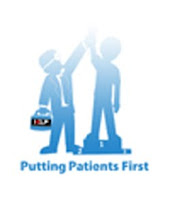Swine Flu
Definition
Swine influenza is flu virus usually found in pigs. The virus occasionally changes (mutates) and becomes infectious in humans. When this happens, the disease becomes a concern to humans, who have little or no immunity against it. This means the virus has the potential to spread quickly around the world. It also may be more difficult to treat than the usual, seasonal human flu viruses.
Alternative Names
Swine flu; Influenza A
Causes
In the spring of 2009, cases of human infection with H1N1 flu were confirmed in Mexico and in several states in the United States. Cases of infection in humans were also reported in other countries.
The H1N1 flu virus is contagious and can spread from human to human. At this time, it is unknown how easily it can spread between people.
It is known that flu viruses can spread from pigs to people, and from people to pigs. However, you CANNOT get H1N1 flu virus from eating pork.
Human-to-human infection with the H1N1 flu virus likely occurs the same way as seasonal flu, when an infected person coughs or sneezes into air that others breathe in. People may also get infected by touching something with the virus on it, such as a door knob or counter, and then touching their mouth or nose.
You can find an updated case count of confirmed H1N1 flu infections in the U.S. at the Centers for Disease Control and Prevention (CDC) web site.
Symptoms
Symptoms of H1N1 flu infection in humans are similar to clasic flu-like symptoms, which might include:
· Fever above 100.4 °F
· Cough
· Sore throat
· Headache
· Chills
· Muscle aches
· Diarrhea
· Vomiting
Exams and Tests
If you think you have been exposed to H1N1 influenza, call your health care provider before your visit. This will give the staff a chance to take proper precautions to protect them and other patients during your office visit.
If the H1N1 flu becomes widespread, there will be little need to continue testing people, so your health care provider may decide not to test for the flu virus.
Your doctor may perform the following physical exam:
· Auscultation (to detect abnormal breath sounds)
· Chest x-ray
Your doctor can test for the H1N1 flu virus using a nasopharyngeal swab (a swab of the back of the inside of your nose), or grow it in a culture. However, this will likely happen only if:
· You are at high risk for flu complications.
· You are very sick.
Treatment
Most people who get H1N1 flu will likely recover without needing medical care. Doctors, however, can prescribe antiviral drugs to treat people who become very sick with the flu or are at high risk for flu complications.
If you need treatment for H1N1 flu, the CDC recommends that your doctor give you zanamivir (Relenza) or osteltamivir (Tamiflu). These drugs work best if you receive them within 2 days of becoming ill. You may get them later if you are very sick or if you have a high risk for complications.
To prevent infection with H1N1 flu, people living in the same house as someone diagnosed with the virus should ask their doctor if they also need a prescription for these medicines. Careful respiratory hygiene and frequent hand-washing are also recommended steps for reducing the risk of getting H1N1 flu.
Aspirin or products that contain aspirin should not be given to anyone 18 years old or younger.
Outlook (Prognosis)
The outlook depends on the severity of the infection and the type of H1N1 influenza virus that caused it.
The H1N1 flu outbreak in Mexico has resulted in 72 confirmed deaths thus far. At least 5 deaths had been reported in the U.S. at the time of this writing. Deaths have occurred in other countries as well. Officials were preparing for more.
For more information, visit:
· CDC - www.cdc.gov/swineflu
· World Health Oganization - www.who.int/csr/disease/swineflu/en/index.html
Possible Complications
Severe illness may occur along with:
· Pneumonia
· Respiratory failure
· Death
Like seasonal flu, H1N1 flu may make other chronic medical problems worse.
A vaccination used to treat swine flu in 1976 was associated with some cases of Guillain-Barre syndrome, a disorder that leads to nerve inflammation that causes muscle weakness.
When to Contact a Medical Professional
If you are ill and have any of the following warning signs, seek emergency medical care.
In children, emergency signs include:
· Fast breathing or trouble breathing
· Bluish or gray skin color
· Not drinking enough fluids
· Severe or persistent vomiting
· Not waking up or not interacting
· Being so irritable that the child does not want to be held
· Flu-like symptoms improve but then return with fever and a worse cough
In adults, emergency signs include:
· Difficulty breathing or shortness of breath
· Pain or pressure in the chest or abdomen
· Sudden dizziness
· Confusion
· Severe or persistent vomiting
· Flu-like symptoms improve but then return with fever and a worse cough
Prevention
People who work with pigs who might be infected should use protective clothing and special breathing masks.
Other steps you can take:
· Cover your nose and mouth with a tissue when you cough or sneeze. Throw the tissue away after using it.
· Wash your hands often with soap and water, especially after you cough or sneeze. You may also use alcohol-based hand cleaners.
· Avoid touching your eyes, nose, or mouth, to avoid getting infected by germs.
· Avoid close contact with sick people.
· If you do get sick, consider staying home from work or school.
Centers in Mumbai
Mumbai Kasturba Gandhi HospitalArthur Road, N M Joshi Marg, Jacob Circle, Mumbai - 11(022) 23083901, 23092458, 23004512
Sir J J HospitalJ J Marg, Byculla, Mumbai - 08(022) 23735555, 23739031, 23760943, 23768400 / 23731144 / 5555 / 23701393 / 1366
Haffkine Institute Acharya Donde Marg, Parel, Mumbai - 12(022) 24160947, 24160961, 24160962





